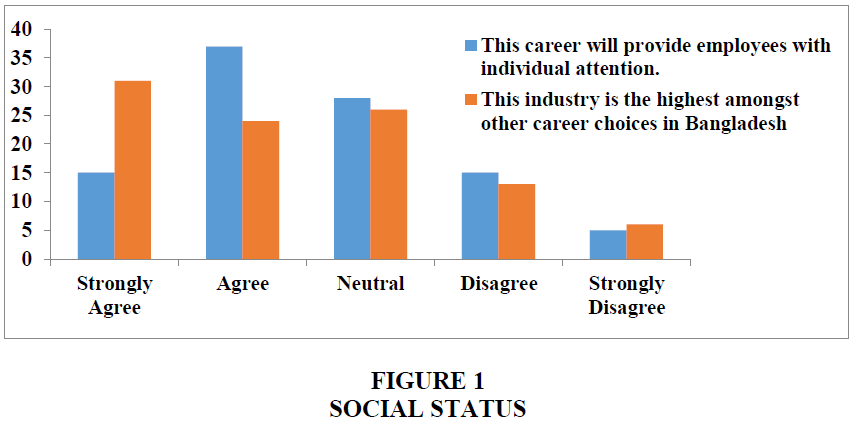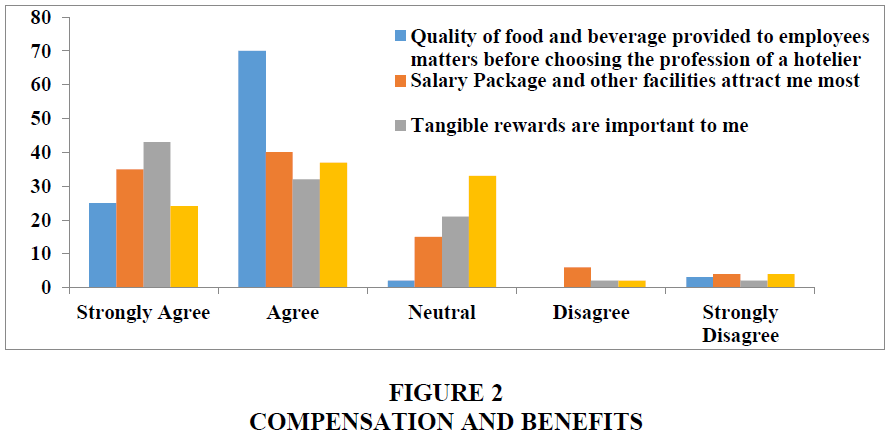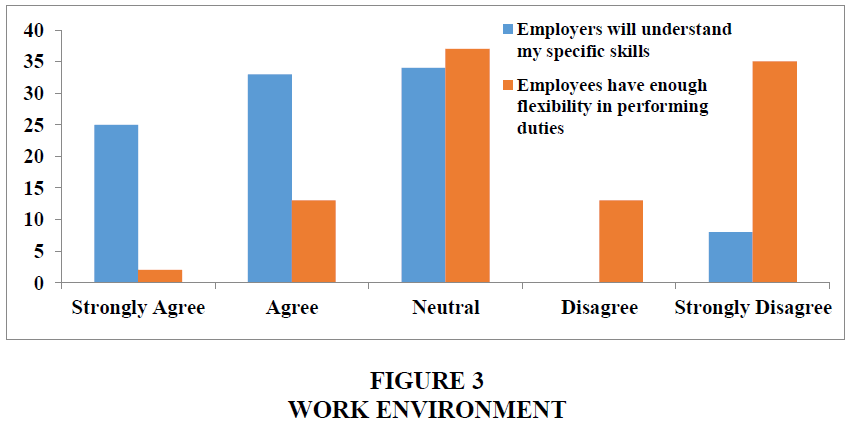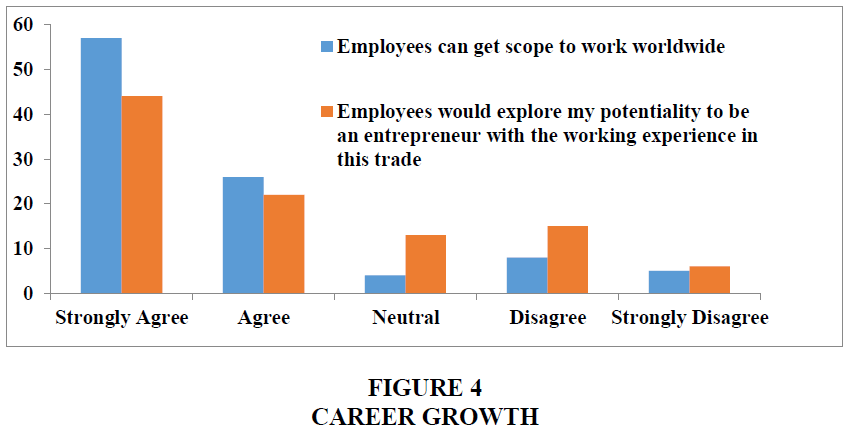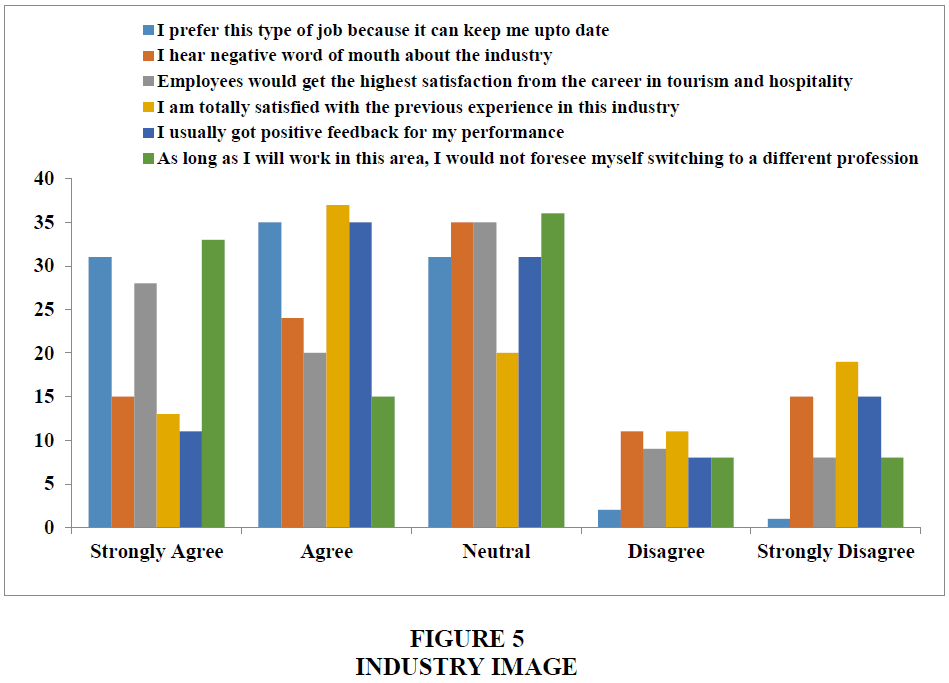Research Article: 2019 Vol: 18 Issue: 6
Factors and Strategies to Drive the Choice of Women Graduates to Enter into Tourism and Hospitality Sector: A Perceptual Strategic Study
Mst. Khadijatul Kobra, Daffodil International University
Md. Ibrahim Khalil, National University
Maksuda Akter Rubi, Daffodil International University
Umme Kulsum, Daffodil International University
Nurul Mohammad Zayed, Daffodil International University
Abstract
Women and their hospitable nature can edify the nightlight of tourism and hospitality industry at a greater extent. The research has been conducted to find out the aspects swaying women to join or not to join tourism industry as well as to suggest some strategies to encourage more women workforce in this trade.The authors have interviewed 20 experts of tourism and hospitality industry, 240 of the women to find out the facts and figures who are graduating in tourism and hospitality department in different universities in Bangladesh as potential workforce by following the sample size formula given by Yamane. The social status analysis shows, though women assume they will get individual recognition but salary package and rewards are not appealing enough. Employees do not have flexibility in performing their jobs while industry image and career growth are not adequate. Therefore, the analysis presents the crucial factors and situations of women who are potential work force in the tourism and hospitality sector along with applicable approaches to raise women’s spirit.
Keywords
Factors, Strategies, Women Graduates, Tourism and Hospitality, Potential Workforce.
Introduction
By birth women have the propensity to contribute for the humanity. They are caring, smile-faced, dedicated, and passionate and combined all these qualities it can be traced as hospitality. Their hospitable nature can enlighten the candle of tourism and hospitality industry at a greater extent. They can explore their career paths and do a lot for the development of this promising sector. The author has interviewed some of the women (current students) who are inclined to engage in tourism sector based on five different aspects to identify the facts and figures. There is ample opportunity to better capitalize on the role of women as a key component of the talent pipeline within the sector to the deep benefit of the global industry as well as individuals and communities where tourism is active (Baum & Cheung, 2015). One of the service sectors is “Tourism”, the fast upcoming Service Industry on the economic scenario of the world and women are feeling as the “face” and “Brand image” of the industry. Apart from the betterment of tourism industry for improving women’s status it has some harnesses for working of women in the sector. As tourism industry is a service industry so everyone feels like women is the showcase of the industry (Jayswal & Jaiswal, 2015). Women are often concentrated in low status, low paid and precarious jobs in the tourism industry (Findings, 2011). Travel & Tourism can provide women with more opportunities for workforce participation, leadership, entrepreneurship and empowerment than many other sectors, particularly in developing countries and as such it can have a tremendous effect on poverty reduction in rural communities. Women’s participation in economic activity brings benefits at both the micro and macro levels (Bazazo et al., 2017). Thus women can help the industry through their creativity & inventiveness but they should be given awareness about the multi-dimensional opportunities available (Nyaruwata & Nyaruwata, 2013).
Literature Review
Due to gender inequality women faces more challenges to join their job, during their job as well in tourism hospitality trade. Tourism is the business that is based on human relations and along these lines social divisions of work are critical and adapting to sex balance issues fundamental since tourism business is sex one-sided being in light of standards of “women’s work” (Swain, 1995). Strategy creators and administration must take activities towards compelling arrangements and build up measure up to circumstance grounds to accomplish much better outcomes on the premise of using female ability which is being squandered because of sex separation, offering them status positions and pay as per their insight and abilities (Kogovsek & Kogovsek, 2015). Women wherever remain seriously impeded contrasted with men over all social criteria and orders (Pritchard, 2014). Tourism is a noteworthy manager of ladies. Notwithstanding, ladies encounter sex separation with respect to achieving official administration positions (Nyaruwata & Nyaruwata, 2013). Ladies make up an extensive extent of the formal tourism workforce. “Advancement” is not an impartial, favorable process be that as it may, one that happens inside a setting of worldwide rebuilding, of which sex imbalances are a key segment. In spite of the fact that numerous parts of tourism advancement arrangement try not to contain an unmistakable sex part, certain gendered suppositions are all things considered present (Ferguson, 2010). Socially developed sexual orientation parts, the natural contrasts amongst men and ladies, and how these associate in the realm of work are in this manner at the center of decent work (Baum, 2013). In Bangladesh very few women employees are seen in the hospitality and tourism sector. However, to ensure the advancement of this industry both men and women should work together. After reviewing the literature authors did not find any relevant research work done before to identify the factors or reasons of less number of women employees and managers in the tourism and hospitality industry. Thus, the authors have conducted the study on the basis of some fundamental factors and tried to focus on the possible solutions to enrich the tourism industry with competent female human resource.
Research Objective
The broad objective of this study is to find out the impelling factors which penetrate the women to choose tourism and hospitality as their wage earning sector and to set some strategies to encourage them to join this segment more and more.
Methodology
To conduct the study both the qualitative (interview with structured questionnaire) and quantitative methods have been used. Interviews are suitable method when there is a necessity to collect in-depth information on people's thoughts, familiarities, and outlooks. Interviews are useful when the topic of analysis relays issues that call for multipart questioning and substantial probing (Wang et al., 2011). To maneuver the study the author has interviewed 20 experts of tourism and hospitality industry, 240 female graduates who are on their way to complete graduations from different universities in the department of tourism and hospitality management and potential employee of hospitality profession. The overall analysis has been accomplished with a structured likert scale questionnaire based on five dimensions like social status, employee benefit, and work environment, self-development as well as industry image. The total population size was approximately 600 females who are undergraduate students in tourism and hospitality management department. Among them 240 females were interviewed on the basis of a simplified formula to calculate sample sizes Yamane (1967) provides. n = N / [1 + N (e) 2, where n is the sample size, N is the population size, and e is the level of precision. A 95% confidence level and P=0.5 are assumed (Neilson, 2011). The outcomes of the analysis have been presented using Microsoft Excel. For theoretical studies secondary data from different sources have been scrutinized. The duration of this study was from June 2018 to July 2019.
Results and Discussions
Social Status Analysis
In the contemporary society working in the hospitality sector is not appreciated at all. The social structure and culture do not permit females to work in the service sector whereas if it is the issue of hospitality then it becomes worse. The members of a girl’s family does not want to support to pursue her career in hotel industry as they think for women only official desk job is secure and honorable. Social acceptance is not achieved if a female work in the hospitality or tourism sector, though a number of women are fighting against all odds. They are prone to study; gather experience and finally succeeding their career path in this trade. Females have to face unwanted questions and social status (Figure 1) is degraded often.
This negative notion creates dissatisfaction among females to carry on their job. Whether this kind of job ensures higher standard of living or not is a big question. Most of the cases it takes too long to get promoted and to achieve growth in the organizations.
Employee Benefit Analysis
The salary package and other facilities are not attractive most of the cases. In hotel industry there is no way to start career from a good position. One has to struggle a lot which created dilemma to choose this sector or not. Job security is not prevalent. Employees feel very vulnerable to keep their job up as they have to be alert always. In search of security they try for alternative employments some times. Getting leave is a big challenge at hotel sector. Additional Benefits are hard to acquire for extra-ordinary performance (Figure 2).
Work Environment
It becomes a great challenge to maintain work-life balance for a female especially if they are working mother. Enjoying flexible working hour or shifting is another challenge but most of the respondents said that the do not have to face any gender discrimination or sexual abasement.
Females rarely have any power to participate in any decision making to contribute for your property. But hopefully in recent times females are holding strong positions like human resource in some hotels which is a matter of great hope in coming days (Figure 3).
Self-Development/Career Growth
To acquire up to date knowledge about the profession is highly required but women get few chances to work worldwide to enhance skills. The number of training and cross-training arrangements should be enhanced. The growth rate is very slow in this sector and to create self-identity is uncertain (Figure 4).
Industry Image
The overall image of the tourism and hospitality sector as an employment is not up to the mark. Different aspects of undesirable image are shown in Figure 5.
Strategies to be adopted to face the challenges
Investing in the tourism promotion and development is a crying need to make sure overall financial growth of Bangladesh (Kobra et al., 2018). In line with that, investment for producing skilled employees is a must. It is very tough for the fresh graduate to start with a designation & handsome package as they may not had enough training and practical orientation during their student life. Job advertisements are insufficient. It is very difficult to get job in the 5 star standard and other renowned establishments while commencing career. Employees may not accept roster duty positively. Family does not support to be employed in this sector. It is difficult to maintain work-life balance while working in this industry. By changing some aspects the ratio of Men: Women within the realm of tourism and hospitality can be upgraded. We can change our perception. Attractive packages can be offered by the industry. Overall, we need to provide standard tourism education to the women through different institutions and higher level graduation, post-graduation programs. Accordingly, the appealing sector for Women can be turned into reality.From the above described situation the authors can infer some propositions to improve the scenario of men: women employee ratio in the tourism industry.
Community awareness must be created and developed to establish the tourism and hospitality job sector as a recognized profession for both male and female. The hotel and airline organizations must provide female employee friendly work environment. Child care center and flexible work hour should be developed. Entry package and other benefits must be good enough to attract potential female graduates. Overall policies should be developed. Standard human resource management and performance appraisal should be there. Educational institutions and industries should work together to enhance skilled female workforce.
Conclusion
There are many issues which have been faced by females to choose the hospitality and tourism sector, to work in this sector and to carry on their professional life for long term. In spite of having huge challenges women are involving in this sector to have a different flavor like knowing people of the various corner of the world, internationalization, secure work environment and so on. The impact of the present research can be witnessed from different slopes as it would emphasize on the women involvement in the tourism organizations and encourage them to join the friendly industry. The identification of factors can pave the way of resolving the barriers of women to make them involved in tourism industry. This research can entail human resource development consisting of male and female in the potential tourism business in Bangladesh. Some effective steps are essential to eradicate the negative situations and factors. If government, educational organizations which are offering hospitality education, industry personnel all work as a combined force then the tourism and hospitality sector will boom soon.
References
- Baum, T. (2013). International perspectives on women and work in hotels, Catering and Tourism.
- Baum, T., & Cheung, C. (2015). White paper women in tourism & hospitality: Unlocking the potential in the talent pool. In Women in Tourism and Hospitality Forum in Hong Kong, Diageo.
- Bazazo, I., Nasseef, M.A., Mukattesh, B., Kastero, D., & Al-Hallaq, M. (2017). Assessing the glass ceiling effect for women in tourism and hospitality. Journal of Management and Strategy, 8(3), 51.
- Ferguson, L. (2010). Analysing the gender dimensions of tourism as a development strategy. Instituto Complutense de Estudios Internacionales.
- Findings, P. (2011). Global report on women in tourism 2010. Global Report on Women in Tourism 2010.
- Jayswal, D.K., & Jaiswal, M. (2015). Women’s participation and tourism industry: An overview. Research Journal of Humanities and Social Sciences, 6(4), 269.
- Kobra, M.K., Bhuiyan, K.H., & Zayed, N.M. (2018). Well and woes of tourism promotion in Bangladesh: Investment perspective. Academy of Accounting and Financial Studies Journal, 22(3), 1-8.
- Kogovsek, M., & Kogovsek, M. (2015). Hospitality and tourism gender issues remain unsolved: A call for research. Quaestus, (6), 194.
- Neilson, T. (2011). King of charcoal: Japanese create new life for dying industry. Inwood Magazine, 96, 32-33.
- Nyaruwata, S., & Nyaruwata, L.T. (2013). Gender equity and executive management in tourism: Challenges in the Southern African Development Community (SADC) region. African Journal of Business Management, 7(21), 2059-2070.
- Pritchard, A. (2014). Gender and Feminist Perspectives in Tourism Research.
- Swain, M.B. (1995). Gender in tourism. Annals of Tourism Research, 22(2), 247-266.
- Wang, L., Zhou, R., & Huang, L. (2011). Research of maximum capacity of grid-connected photovoltaic power station based on the “box” set robust optimization. APAP 2011 - Proceedings: 2011 International Conference on Advanced Power System Automation and Protection.
- Yamane, T. (1967). Statistics: An Introductory Analysis. 2nd Edition, Harper and Row, New York.
